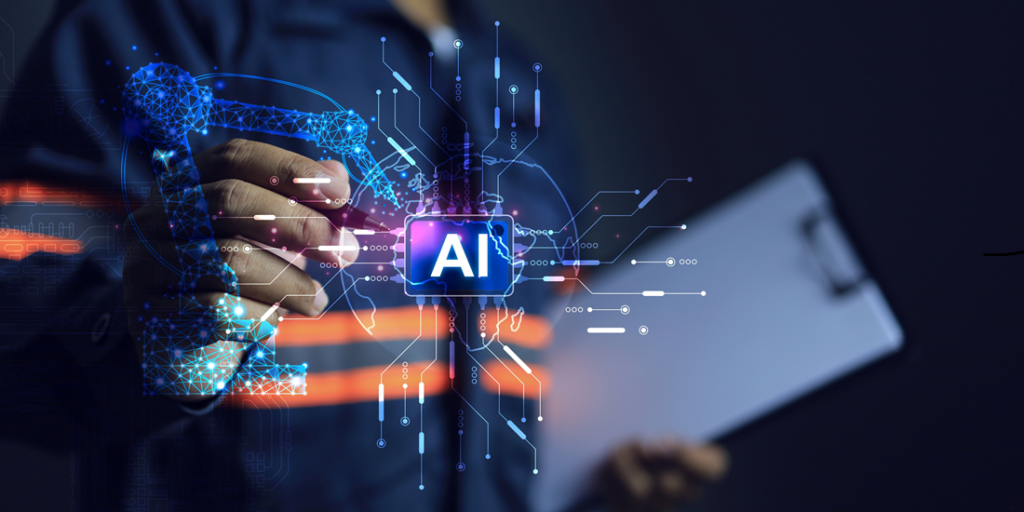
Daniel D. Gutierrez, Editor-in-Chief & Resident Data Scientist, insideAI News, is a practicing data scientist who’s been working with data long before the field came in vogue. He is especially excited about closely following the Generative AI revolution that’s taking place. As a technology journalist, he enjoys keeping a pulse on this fast-paced industry.
The manufacturing industry, traditionally viewed as a domain reliant on human labor and mechanical processes, is undergoing a profound transformation driven by artificial intelligence (AI). This revolution promises to enhance efficiency, reduce costs, and improve overall product quality. Here, we explore the multifaceted impact of AI on manufacturing and how it is reshaping the industry’s landscape.
Enhanced Production Efficiency
One of the most significant ways AI is revolutionizing manufacturing is through the enhancement of production efficiency. AI algorithms analyze vast amounts of data from various stages of the production process to identify patterns and optimize workflows. This capability allows for predictive maintenance, where machinery can be serviced before a failure occurs, reducing downtime and extending the lifespan of equipment. For instance, General Electric uses AI-driven predictive maintenance to monitor its machinery, resulting in a reduction in unplanned downtime.
Moreover, AI-driven automation has introduced smart manufacturing systems. These systems utilize machine learning algorithms to adapt to new data inputs and make real-time adjustments to production lines. This adaptability not only increases the speed of production but also ensures that resources are used optimally, minimizing waste. Companies like Siemens have adopted AI-powered automation in their factories, leading to more streamlined operations and significant cost savings.
Quality Control and Assurance
Quality control is another critical area where AI is making a substantial impact. Traditional quality assurance methods are often time-consuming and prone to human error. AI, however, offers more precise and efficient solutions. Machine vision systems, powered by AI, can inspect products at every stage of the production process, identifying defects that might be invisible to the human eye. These systems ensure that only products meeting the highest standards reach the market.
For example, Fanuc, a leading manufacturer of industrial robots, employs AI for quality control in its production lines. The AI systems detect minute inconsistencies in products, ensuring a level of quality that was previously unattainable. This has led to a decrease in returns and an increase in customer satisfaction.
Supply Chain Optimization
AI is also revolutionizing supply chain management in manufacturing. Traditional supply chain models often struggle with inefficiencies due to the complexity and variability of global markets. AI addresses these challenges by providing enhanced visibility and predictive capabilities.
By analyzing data from various sources, such as market trends, weather patterns, and supplier performance, AI can forecast demand more accurately and optimize inventory levels. This reduces the risk of overproduction or stockouts, ensuring that manufacturers can meet customer demand without excessive inventory costs.
IBM’s Watson, for example, is utilized by several manufacturers to enhance supply chain efficiency. Watson’s AI algorithms analyze vast datasets to predict demand and optimize supply chain logistics, resulting in reduced costs and improved delivery times.
Personalization and Customization
Consumer demand for personalized products is on the rise, and AI is playing a crucial role in enabling mass customization in manufacturing. AI algorithms can analyze consumer preferences and feedback to design products tailored to individual tastes. This capability allows manufacturers to offer a high degree of customization without sacrificing efficiency.
Nike, for instance, uses AI to offer personalized shoes. Customers can design their footwear online, and AI systems in the manufacturing process ensure that these custom orders are produced efficiently. This approach has not only boosted customer satisfaction but also set a new standard for customization in the industry.
Sustainability and Energy Efficiency
Sustainability is becoming increasingly important in manufacturing, and AI is contributing significantly to this goal. AI systems can optimize energy usage in factories, reducing the carbon footprint of manufacturing processes. By analyzing data on energy consumption, AI can identify areas where energy is being wasted and suggest improvements.
Additionally, AI can aid in the development of sustainable materials and processes. By simulating different scenarios and analyzing their outcomes, AI helps researchers and manufacturers develop environmentally friendly alternatives to traditional materials and methods.
Tesla, a leader in sustainable manufacturing, uses AI to optimize its energy usage and production processes. AI-driven analytics have enabled Tesla to reduce energy consumption and minimize waste, aligning with its commitment to sustainability.
Future Prospects and Challenges
The future of AI in manufacturing holds immense promise, but it also presents challenges. As AI systems become more integrated into manufacturing processes, concerns about data security and privacy are paramount. Manufacturers must ensure that their AI systems are robust and secure against cyber threats.
Furthermore, the transition to AI-driven manufacturing requires significant investment and a skilled workforce capable of managing advanced technologies. Companies must invest in training and development to equip their employees with the necessary skills to work alongside AI systems.
Despite these challenges, the potential benefits of AI in manufacturing are undeniable. By enhancing efficiency, improving quality control, optimizing supply chains, enabling personalization, and promoting sustainability, AI is set to revolutionize the manufacturing industry. As technology continues to advance, the synergy between AI and manufacturing will undoubtedly lead to even greater innovations and improvements, paving the way for a more efficient and sustainable future in manufacturing.
Sign up for the free insideAI News newsletter.
Join us on Twitter: https://twitter.com/InsideBigData1
Join us on LinkedIn: https://www.linkedin.com/company/insideainews/
Join us on Facebook: https://www.facebook.com/insideAINEWSNOW





Speak Your Mind